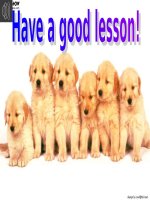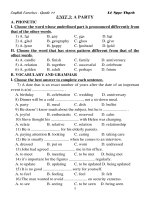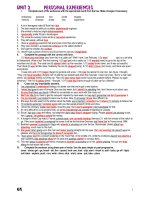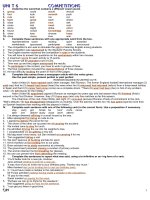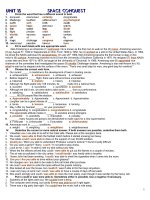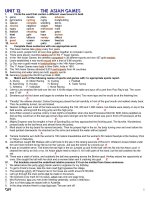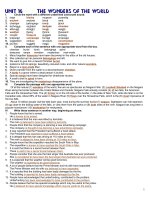11CB UNIT 15 -3 TEST
Bạn đang xem bản rút gọn của tài liệu. Xem và tải ngay bản đầy đủ của tài liệu tại đây (137.86 KB, 8 trang )
UNIT 15 SPACE CONQUEST
I. Circle the word that has a different sound in bold.
1. conquest cosmonaut certainty congratulate
2. challenge lauched achievement psychological
3. earth with birth death
4. space tragic astronaut gravity
5. feat speed leap death
6. flight precise orbit desire
7. shuttle success support century
8. off of if fly
9. tragic challenge congress engineer
10. cosmonaut possible honour hero
II. Fill in each blank with one appropriate word.
Neil Armstrong is an American (1) astronaut. He is known as the first man to walk on the (2) moon. Armstrong was born (3)
on August 5
th
, 1930 in Wapokoneta in Ohio. From 1949 to 1952, he (4) worked as a pilot in the United States Navy. In 1962, he
joined the NASA astronaut (5) programmes. On July 20
th
1969, Neil Armstrong became the first human to step on the moon’s (6)
surface. Armstrong received his M.S from the University of Southern California in 1970. He resigned (7) from NASA a year later
and from 1971 to 1979, he taught at the University of Cincinnati. In 1986, Armstrong was (8) appointed vice chairman of the
committee that investigated the space (9) shuttle Challenger disaster. Armstrong is also well-known for (10) what he said as he
stepped onto the surface of the moon: “That’s one small step for man, one giant leap for mankind.”
III. Choose the correct verb form.
1. Our recent _____ in medicine is the development of laser in treating cancer.
a. achievements b. achievement c. achievers d. achieved
2. Before Gagarin’s _____ flight, there were still enormous uncertainties.
a. historical b. historic c. history d. historian
3. Although his flight lasted only 108 minutes, its _____ made him a national hero.
a. succeed b. successful c. successive d. success
4. Although we didn’t win, we were able to take some _____ from our performance.
a. satisfying b. satisfactions c. satisfaction d. satisfactory
5. _____ 60,000 people filled the stadium.
a. Approximately b. Approximate c. Approximant d. Approximation
6. Laughter can be a great release of _____.
a. tense b. tension c. tenseness d. tensing
7. May I offer my heartest ______ on your promotion?
a. congratulating b. congratulation c. congratulations d. congratulate
8. The appropriate attitude makes it ______ to socialize among strangers.
a. possible b. possibility c. impossible d. possibly
9. ______, many houses are going to be demolished to make ways for a new supermarket.
a. Fortunate b. Unfortunate c. Fortunately d. Unfortunately
10. Astronauts work in ______ conditions.
a. weight b. weighting c. weightless d. weightlessness
IV. Underline the correct or more natural answer. If both answers are possible, underline them both.
1. Valuables can / are able to be left in the hotel safe. Please ask at the reception desk.
2. We could / were able to finish the football match before it started snowing too heavy.
3. The rebels could / were able to draw on the support of over 20,000 soldiers.
4. Could you / Were you able to understand Professor Larsen's lecture? I found it really difficult.
5. 'Do you want a game?' 'Sorry, I can't / 'm not able to play chess.
6. Look at me, I can / 'm able to ride my bike without any help.
7. When the fire officers arrived they could / were able to put out the flames in a couple of minutes.
8. The air was so polluted in the city center, I could hardly / was hardly able to breathe.
9. I knew John had been smoking. I could / was able to smell the cigarettes when I came into the room.
10. Can you / Are you able to drive without your glasses?
11. No changes can / are able to be made to this rail ticket after purchase.
12. He could / was able to untie the ropes without the guards noticing.
1
13. She looked all over the house, but couldn't / wasn't able to find her keys anywhere.
14. I was very busy at work; but I could / was able to have a couple of days off last week.
15. She swam strongly and could / was able to cross the river easily, even though it was swollen by the heavy rain.
V. Put in could or was/ were able to. Sometimes either is possible. Use a negative if necessary.
1. Suddenly all the lights went out. We couldn't see a thing.
2. The computer went wrong, but luckily Emma was able to put it right again.
3. There was a big party last night. You could hear the music half a mile away.
4. I learnt to read music as a child. I could/ was able to read it when I was five.
5. People heard warnings about the flood, and they were able to move out in time.
6. The train was full. I couldn't / wasn't able to find a seat anywhere.
7. Mrs. Carter was able to put out the fire before the house burnt down.
8. I looked everywhere for the book, but I couldn't find it.
9. The plane was able to take off at eleven o'clock, after the fog had lifted.
10. It was foggy, so the plane couldn't / wasn't able to take off.
VI. Add question tags to the following statements.
1. He hardly ever makes a mistake, does he?
2. Nobody liked the play, did they?
3. She'd save money if she bought fresh food, wouldn't she?
4. She's very' funny. She's got a great sense of humour, hasn't she?
5. The area was evacuated at once, wasn't it?
6. Mr Smith usually remembered his wife's birthdays, didn't he?
7. It never works very well, does it?
8. He ought to have made a note of it, oughtn't he?
9. Neither of them offered to help you, did they?
10. There'll be plenty for everyone, won't there?
11. Let's go out for dinner tonight, shall we?
12. That isn't Bill driving, is it?
13. Nothing went wrong, did it?
14. There used to be trees here, didn't there?
15. This won't take long, will it?
16. Don't touch that button, will you?
17. I'm too late, aren't I?
18. Not a very good film, was it?
19. Somebody wanted a drink, didn't they?
20. They think he's funny, don't they?
VII. Fill in each blank with an appropriate preposition.
1. Yuri Gagarin lifted off into space aboard the Vostok 1 at 9.07 a.m. Moscow time on 12th April, 1961.
2. He was in orbit around the Earth at a speed of more than 17,000 miles per hour.
3. No one knew precisely what would happen to a human being in space.
4. How would the mind deal with the psychological tension?
5. How would the body react to the extreme changes in temperature?
6. We congratulate you on your successful flight.
7. The American people shared with the Soviet people their satisfaction for the safe flight.
8. After his death, his hometown was named after him.
9. China became the third country in the world to be able to independently carry out manned space flights.
10. China launched its first manned spacecraft into space on October, 2003.
VIII. Use the cues given to write a complete sentence.
1. nowadays/ our lives/ improved/ much/ progresses/ science and technology//
Nowadays our lives have been much improved by the progresses made in science and technology.
2. II want/ become/ astronaut/ I/ able/ travel/ fast/ sound//
I want to become an astronaut so that I will be able to travel faster than sound.
2
3. Sally Ride/ one/ five astronauts/ space shuttle Challenger/, completed/ successful six-day voyage/ space//
Sally Ride was one of the five astronauts on the space shuttle Challenger, which completed a successful six-day voyage in
space.
4. Neil Armstrong/ famous! American astronaut/ known/ first/ walk/ the moon//
Neil Armstrong, a famous American astronaut, is known as the first person to walk on the moon.
5. July 20th 1969/ two Americans/ land/ moon/ spaceship/ name/ Apollo//
On July 20
th
1969 two Americans landed on the moon in the spaceship named Apollo.
6. Yuri Gagarin/ first man/ travel/ space//
Yuri Gagarin was the first man to travel in space.
7. Yuri Gagarin/ make/ another space flight/ if/ tragic accident/ not occur//
Yuri Gagarin could have made another space flight if a tragic accident had not occurred.
8. China/ become/ third country/ world/ able/ independently/ carry/ manned space flights//
China became the third country in the world to be able to independently carry out manned space flights.
UNIT 15 TEST 1
I. PRONUNCIATION
Choose the word that has the underlined part pronounced differently from that of the others.
1. a. foot b. moon c. look d. would
2. a. gravity b. aspiration c. biography d. possible
3. a. technical b. conquest c. psychology d. launched
4. a. national b. venture c. fortunate d. suggestion
5. a. support b. shuttle c. success d. venture
II. LANGUAGE FOCUS
A. Choose the word or phrase - a, b, c or d - that best completes the sentence or substitutes for the underlined word or
phrase.
6. Neil Armstrong was the first man to walk on the moon ______ 20 July 1969.
a. in b. at c. on d. of
7. She is never satisfied ______ what she's got.
a. to b. with c. for d. in .
8. In 1961 Yuri Gagarin lifted ______ into space aboard the Vostok 1.
a. off b. up c. on d. Ø
9. After landing, the team members were greeted like ______ heroes.
a. conquer b. conquering c. conqueror d. conquest
10. No one knew precisely what would happen to a human being in space.
a. exactly b. clearly c. carefully d. vividly
11. Neil Armstrong, an American ______, was the first man to step on the moon's surface.
a. scientist b. cosmonaut c. astronaut d. astronomer
12. The 27-year-old Soviet cosmonaut became the first person to eat and drink in ______.
a. weight b. weighting c. weightless d. weightlessness
13. About 100 Russian satellites are the earth.
a. flying b. orbitting c. traveling d. circuiting
14. Many people are demonstrating to express their ______ with the new land law.
a. satisfied b. satisfactory c. satisfaction d. dissatisfaction
15. The astronauts were able to send the information back to the earth.
a. spaceships b. space stations c. spacemen d. space shots
B. Choose the word or phrase - a, b, c or d - that best completes the sentence.
16. No one is better cook than his mother, ______?
a. is she b. isn't she c. are they d. aren’t they
17. Do it right now, ______?
a. will you b. shall you c. do you d. don't you
18. There are no easy ways to learn a foreign language, ______?
a. are they b. are there c. aren't they d. aren't there
19. He seldom goes to the library, ______?
3
a. doesn’t he b. is he c. does he d. isn’t he
20. Let's go for a long walk, ______?
a. will we b. shall we c. don't you d. do you
21. I'd lost my key, so I ______ the door when I got home.
a. could lock b. wasn't able to lock
c. couldn't unlock d. was able to unlock
22. When Mr. Lee was younger, he ______ work in the garden for hours.
a. has got to b. should be able to c. can d. could
23. Yesterday I ______ to a furniture store. I bought a new lamp there.
a. could go b. could have gone c. went d. ought to have gone
24. Do you think there ______ less conflict in the world if all people ______ the same language?
a. would be/ spoke b. were/ would speak
c. were/ spoke d. would have been/ had spoken
25. Jupiter is the largest planet in the solar system, ______ eleven times the size of the earth.
a. being b. has c. is d. having
C. Choose the word or phrase - A, B, C or D -that needs correcting.
26. After the stock market crash of 1929, less people were able to find
A B (fewer) C
Employment
D
27. The average temperature on Mars, the fourth planet from the sun, is
A B C
about eighty degrees than colder on Earth.
D (colder than)
28. Halley's comet was named of the astronomer Edmund Halley, who
A (named after)
was the first to realize that some comets appear in regular cycles.
B C D
29. A number of people still wants to apply for the position of accountant in
A B (want) C D
that company.
30. If I were a little taller I could be astronaut, but I don't meet the
A B C D
height requirement. (an astronaut)
III. READING
A. Fill in each blank space with one appropriate from the box.
manned seriously affected space radiation groundless
weightlessness harmless journey flown appeared effects
Before man had (31) flown in space it was thought that his physical and mental capabilities might be (32) affected by long
periods of (33) weightlessness,and that he might be endangered by high levels of (34) radiation. Yuri Gagariri's first (35) space
flight in April 1961 showed that man could live in space and, although this (36) journey only lasted for 108 minutes, it gave
encouragement to those interested in the future of (37) manned space flight. In fact most of the early fears about man's health in
space have proved (38) groundless, and although several odd medical (39) effects have been observed, none has (40) seriously
affected man's ability for useful work.
B. Read the passage carefully, then decide whether the following statements are true (1) or false IF).
Throughout history there have been many great explorers. Have you, for example, heard of Marco Polo, the famous Italian
traveler? He was the first European to travel to China. He arrived in China in the late 13
th
century. About 200 years later,
Christopher Columbus sailed from Spain by ship. He was looking for a new way to reach India. However, as you probably know, he
didn't reach India. He landed in America. Five hundred years after Columbus in the' 1930s a famous explorer named Richard Byrd
was one of the first persons to fly over both the North and the South Poles. Today we continue to explore this world and are
studying to explore other worlds, too. In the 1930s Russian and American scientists sent many unmanned spacecraft to the moon.
These spacecraft sent back very valuable information about the moon. Then on July 16th 1969 the first manned spaceship to the
moon left earth. On that day Apollo 11 blasted off with three American astronauts on board. Four days after blast-off, two of these
astronauts landed on the moon. They later explored the surface of the moon. About two days after landing on the moon, they
started back to the earth. They arrived safely back on earth a few days later. Today we are sending unmanned spacecraft to other
planets. In the future, we might walk on Mars or Venus the way we did on the moon. We might even travel to other galaxies. Who
knows? One thing we know for sure is that we will continue to explore this world and other worlds, too.
41. Marco Polo traveled from England to China in the late 13th century. F
42. While he was looking for India, Christopher Columbus reached America. T
4
43. In the 19thcentury Richard Byrd flew over both the North and the South Poles. F
44. Unmanned spacecraft went to the ,moon before manned spacecraft did. T
45. Apollo 11 was the first manned spaceship to go to the moon. T
46. Apollo 11 was damaged in the blast. F
47. All of the American astronauts on the spaceship landed on and explored the surface of the moon.
F
48. Today we are sending spacecraft with astronauts on board to other planets. F
IV. WRITING
Choose the phrase that best completes the sentence.
49. ______ by meteorites whose impact formed craters of all size.
a. The surface of the moon was shaped
b. The moon whose surface shaped
c. The surface of the shaped moon
d. The surface was forming the shape of the moon
50. Many craters on the earth's surface were probably formed by very large meteorites ______.
a. when smashed into the ground was an explosion
b. which smashed into the ground and an explosion
c. smashing into the ground and exploding
d. they smashed into the ground and exploded
51. Throughout history, the moon has inspired not only song and dance ______.
a. but poetry and prose as well b. but poetry also prose
c. together with poetry and prose d. and also poetry and prose
52. Claudius Ptolemy, ______ of the first century A.D., left a good description of the geocentric theory.
a. he was an astronomer and a philosopher
b. being an astronomer and a philosopher
c. an astronomer and who was a philosopher
d. who was an astronomer and a philosopher
53. ______ the fifth largest among the nine planets that make up our solar system.
a. The Earth being b. The Earth is
c. That the Earth is d. Being the Earth
54. If my aunt had not fallen down yesterday, ______.
a. her legs would not be hurting now
b. she can walk normally now
c. she does not have to go on crutches now
d. she would not have been painful now
55. Glass that has been tempered may be up to ______.
a. as hard as ordinary glass five times
b. five times as hard as ordinary glass
c. hard as ordinary glass five times
d. ordinary glass as hard as five times
UNIT 15 TEST 2
I. PRONUNCIATION
Choose the word that has the main stress placed differently from that of the others.
1. a. scientist b. president c. engineer d. astronaut
2. a. conquest b. venture c. technical d. artificial.
3. a. biography b. psychological c. approximate d. congratulate
4. a. aspiration b. gravity c. challenge d. fortunate
5. a. success b. cosmonaut c. extreme d. appoint
II. LANGUAGE FOCUS
A. Choose the word or phrase - a, b, c or d - that best completes the sentence or substitutes for the underlined word or
phrase.
6. The Cosmonaut Training Center at Star City, Russia was named ______ him.
a. of b. on c. for d. after
7. China became the third country in the, world to be able to independently carry ______ manned space flights.
5
